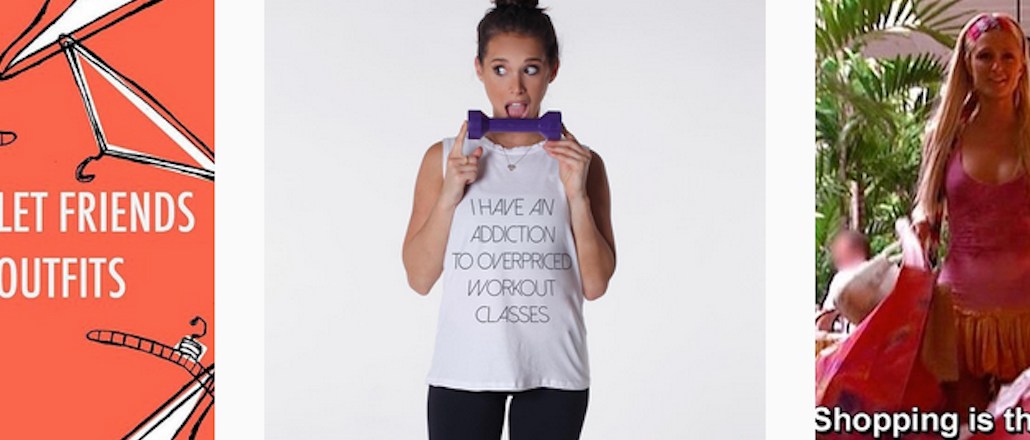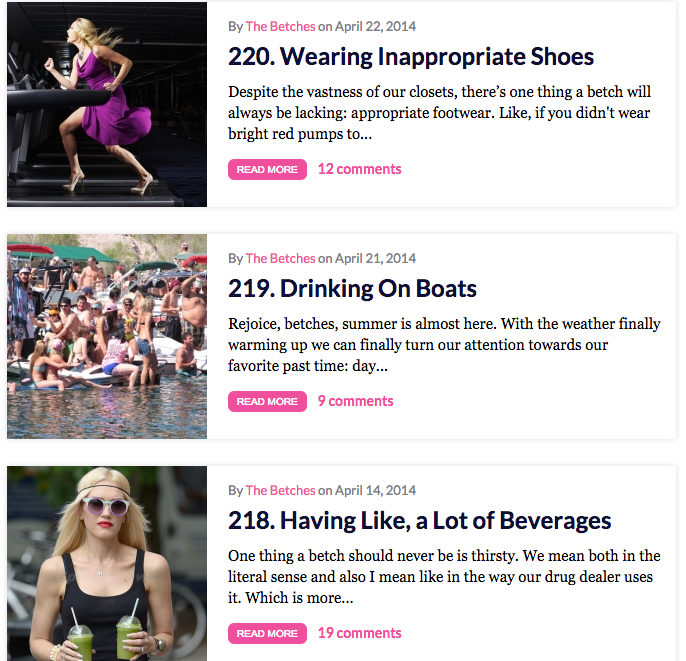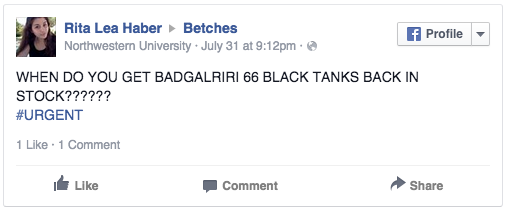Secure your place at the Digiday Media Buying Summit in Nashville, March 2-4

A $44 tank top that reads “Namast’op I Can’t Even,” a $20 tote bag labeled “All of my shit’s in here,” and a $32 “Bad Betch” sports bra are just a sample of what you can buy from Shop Betches, the retail store run by millennial lifestyle website Betches Love This.
If those slogans sound like jibberish to you, you’re probably not a betch — the phonetic spelling of “bitch” pronounced with ample vocal fry. Betches Love This launched in 2011 as the go-to site for young women to get caught up on articles detailing the ins and outs of a “betchy” lifestyle, which revolves around being rich, skinny, pretty and privileged while doing a minimal amount of actual work. Betches are educated but disinterested, love partying and talking smack, and can manipulate their bosses, parents and boyfriends to get what they want.
Most important for the brand’s retail store, at least: They love to shop and have access to a credit card (likely their dad’s, but maybe their own).
“Shop Betches was a natural extension of the brand,” said Betches Love This co-founder Aleen Kuperman, who spearheaded the retail leg of the business in May 2014. “We started with a few tank tops with printed phrases on them, and the feedback was overwhelming.”
Kuperman described the Betches brand as one that “says the thoughts that run through girls’ heads but they’re afraid to say it themselves. We’re unapologetic and self-aware.” That brand has commanded a huge pull on social media, where @betches has 2.4 million Instagram followers (a separate retail account, @shopbetches, has 133,o00).
On the platform, it’s an influencer’s game, and the Betches’ brand is both aspirational and exclusive — two traits that can sell product.
“If you’re influential in a particular space, like fashion, you have a valuable audience and can sell to them because you have a vision for it,” said Jason Stein, founder and CEO of social media agency Laundry Service. “For publishers, the question is, what product can you sell that reflects what you’re an expert in?”
For Betches, translating the brand it built on its website into a retail store meant capitalizing on trends, like festival wear and athleisure. The latter trend has spawned Betches-approved tank tops that read “You Can’t Spin With Us” and matching leggings. To create its items, Betches works with Spectrum Designs, a not-for-profit that benefits kids with autism.
The connection to the website’s content isn’t hard to trace. On The Betch List, an anchor of the website that itemizes the behavior and obsessions of a betch, No. 179 is “Expensive Workout Clothes.”

According to Kuperman, Shop Betches is continuously growing. The store averages 1,000 orders a month and brings in up to $60,000 in the same amount of time, strong figures for a business model (publisher-turned-retailer) that’s tough to crack, according to Jon Reily, Razorfish’s vp of commerce strategy.
“The key is keeping the spirit of the brand alive in the store, and Betches has done a fabulous job with that,” said Reily. “They’ve managed to bridge between content and retail, and that’s something other publications have failed at.”
Reily said Shop Betches knows its customer. Similar to the content on Betches Love This, the items in the store have “irreverent and snappy copy” and are targeted to a digitally savvy demographic. Plus, Betches have kept the store small, both making the items more exclusive and optimized for a short attention span. “You can dip in and dip out, and that’s what it needs to be,” said Reily.
Kuperman said that fans of Betches are “extremely loyal” — Betches Love This sees about 2.5 million unique visitors a month — which has also helped the store’s sales.
“People keep coming back and re-ordering things,” she said. “They love everything, and they continue to buy a lot of it, so that’s been very positive reinforcement each month.”
Stein compared the Betches’ store to the opportunity Instagram personalities The Fat Jew (@thefatjewish) and Babe Walker (@whitegirlproblems) saw to create their own brand of rosé, White Girl Rosé.
“You have to have some kind of insight into your community that can give you leverage and confidence in the market,” said Stein. “If you’re an influencer and your audience gives you insight into what they want and they’re willing to pay for it, then you have something to offer.”
Kuperman said that they hope to have a back-to-school collection of dorm accessories for college betches soon (a key part of their demographic), and while they have no current plans to expand to brick-and-mortar, a New York City pop up could be in the works in order to put in some face time with fans.
“It’s one of the trends we’re seeing in retail right now, that retailers want to be partners with their customers rather than merchandisers,” said Reily. “They want to be on the same team, and that works especially well when you’ve built up a strong readership.”
More in Marketing

Thrive Market’s Amina Pasha believes brands that focus on trust will win in an AI-first world
Amina Pasha, CMO at Thrive Market, believes building trust can help brands differentiate themselves.

Despite flight to fame, celeb talent isn’t as sure a bet as CMOs think
Brands are leaning more heavily on celebrity talent in advertising. Marketers see guaranteed wins in working with big names, but there are hidden risks.

With AI backlash building, marketers reconsider their approach
With AI hype giving way to skepticism, advertisers are reassessing how the technology fits into their workflows and brand positioning.






